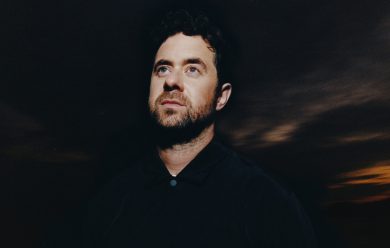After making his mark with a solo piano project and a subsequent foray in electro territory, composer Jean-Michel Blais is now exploring the world of orchestral music, presenting Aubades – an album recorded with 12 musicians, led by conductor Nicolas Ellis.
 One could easily say that Jean-Michel Blais is addicted to risk-taking. He’d never composed for an orchestra before embarking on the creation of Aubades (out Feb. 4, 2022), a flourishing one-hour opus that’s nothing short of a symphony. As it turns out, it was a colossal project that pushed him to his limits.
One could easily say that Jean-Michel Blais is addicted to risk-taking. He’d never composed for an orchestra before embarking on the creation of Aubades (out Feb. 4, 2022), a flourishing one-hour opus that’s nothing short of a symphony. As it turns out, it was a colossal project that pushed him to his limits.
“At some point, I came this close to just giving everything to an arranger,” he admits. “I felt like I bit off way more than I could chew, and then Nico Ellis would say, ‘You know, Jean-Mich, it’s the first time you’ve tried arranging, it’s the first time you write [the music out in notation], you have 100 pages, your score is 100 pages long, for a total of one hour of music, for 12 musicians.’ And it’s true that I put a lot on my shoulders… Would I do it all over again? No doubt, but not right away!” he says in a burst of laughter. “It’s quite intense. You get to a point where your brain hurts. it’s not easy to imagine 12 different voices at once.”
And yet, the newcomer to arranging took up the challenge without getting lost in it, carried by his unique chord combinations, and his characteristic harmonic progressions. In the end, it’s like his essence, his entire style, has been multiplied tenfold.
But even though he’ll likely gain new fans among various types of music lovers, Blais is worried he might lose some of his earlier fans in the twists and turns of his experimentation. “I know it’s not the smartest move, industry-wise,” he says. “When you hit, it’s always better to stick to what you know, cater to your target audience, and make money. The thing is, I’m afraid I’ll die a slow death doing the opposite.”
An Extended Hand
One of Blais’ goals with Aubades was to bring “savant” music to the masses, to strip away the haughty, even aristocratic veneer that comes with his kind of grand orchestral flights-of-fancy. At least historically. “I’m not a revolutionary, I’m a popularizer, maybe,” says Blais. “A ‘democratizer,’ even though I know that’s not a word. That’s how I see myself.”
To achieve his goals, the pianist has taken the gamble of placing his collaborators at the very heart of the project, as if to remind us that it’s not robots who perfectly play his compositions. “What I was interested in was the life of those musicians, hearing them breathe, hearing their instruments creak, hearing them whisper,” he says. “It’s crucial for me to feel the humans behind the notes scribbled on paper. The studio is full of life… When you mic each individual, you start feeling their humanity. I think next time I’ll even mic [conductor] Nicolas Ellis, so we can hear his baton swingin’!”
Blais promises that he’s circling back to his first love after this ensemble work cycle. “I’m already pining to make a solo piano album,” he says adamantly, and stops short of proffering a release date.
Meanwhile, he flutters about from one style to the next, allowing himself the freedom to enrich his roadmap. The new assets he realizes will inevitably reflect on his more minimalist, but never stripped-down, musical offerings.
“I don’t want to do background music, you know, the kind of mezzo piano pieces that are so banal, you don’t even know who you’re dealing with anymore,” he says. “I’ve always been motivated by awakening people’s ability to really dig music, instead of just consuming it as a product or a sonic decor like Satie, or any Spotify list that you play in the background, like wallpaper. I believe that everyone can get into instrumental music for more than five minutes.”
And it’s all the easier to do when – flanked by brilliant musicians – Blais transports us to a universe as cinematic and enveloping as the one on Aubades.